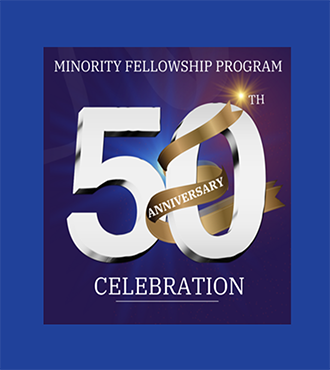Reflecting on 50 Years of the Minority Fellowship Program
By MFP Project Director, Ina A. Ramos, Ph.D.
The MayaTech Corporation
In 1973, the Center for Minority Health (CMH) at the National Institute of Mental Health (NIMH) recognized the lack of equipped mental health professionals to provide culturally competent mental health services and research to an increasing culturally and racial/ethnically diverse population. This same year, the CMH invited the American Sociological Association (ASA) to submit a grant proposal to support doctoral level training for racial/ethnic minority sociologists. In 1974, NIMH awarded a small training grant to ASA for the purpose of supporting doctoral education for racial/ethnic minority researchers and clinicians. The first grants were awarded to four core professional associations: the American Nurses Association, the American Psychiatric Association, the American Psychological Association, and the Council on Social Work Education.
In 1992, the Minority Fellowship Program (MFP) was transferred from NIMH to the newly formed Substance Abuse Mental Health Administration (SAMHSA). SAMHSA added the American Association of Marriage and Family Therapy in 2007; the National Board for Certified Counselors in 2012, and the Association for Addictions Professionals in 2014. Also in 2014, the previously titled Now Is the Time MFP was expanded to prepare the core disciplines to provide behavioral health services to underserved minority youth, adolescents, and transitional-aged youth (MFP-Youth) and to increase the number of available master's level addiction counselors (MFP-AC).
In 2018, the MFP master's programs expanded their focus to recruit master's level fellows seeking to work with underserved minority populations, beyond youth. And most recently, in 2020, the Interdisciplinary Minority Fellowship Program (IMFP) grant was awarded to the American Psychological Association as a collaborative effort with the American Association for Marriage and Family Therapy, the American Nurses Association, the Council on Social Work Education, the National Board for Certified Counselors, and the Association for Addiction Professionals. The principal aim of the IMFP is to increase the knowledge of mental health professionals on issues related to prevention, treatment, and recovery support for individuals who are from racial and ethnic minority populations and have a mental or co-occurring mental and substance use disorders.

On June 8, 2023, the MFP fellows, alumni, grantees, and supporters convened at SAMHSA in Rockville, Maryland, to observe the 50th year of the MFP. During the hybrid event, participants were able to celebrate and recognize the tremendous impact of the MFP in diversifying and strengthening the behavioral health workforce, working to reduce health disparities, and improving behavioral health outcomes for racial and ethnic populations. The event featured welcome remarks by Assistant Secretary for Mental Health and Substance Use Dr. Miriam E. Delphin-Rittmon, an MFP alumna; and a keynote address by her MFP mentor, Associate Dean for Student Success, and Retention Dr. David Rollock of the Graduate School at Purdue University, also an MFP alumnus. In addition, participants were able to hear about diverse MFP experiences during three panel discussions (grantees, current fellows, and alumni), and learn about the research of current fellow's during a poster session. Attendees left the event feeling excited, energized, and hopeful about the future of the MFP.
It was truly an honor to gather in recognition 50 years of the MFP, to reflect on its history, and to highlight the rich legacy of those who have worked and who continue to work in pursuit of the honorable goals of this program. Please visit the SAMHSA MFP Program webpage for more information.